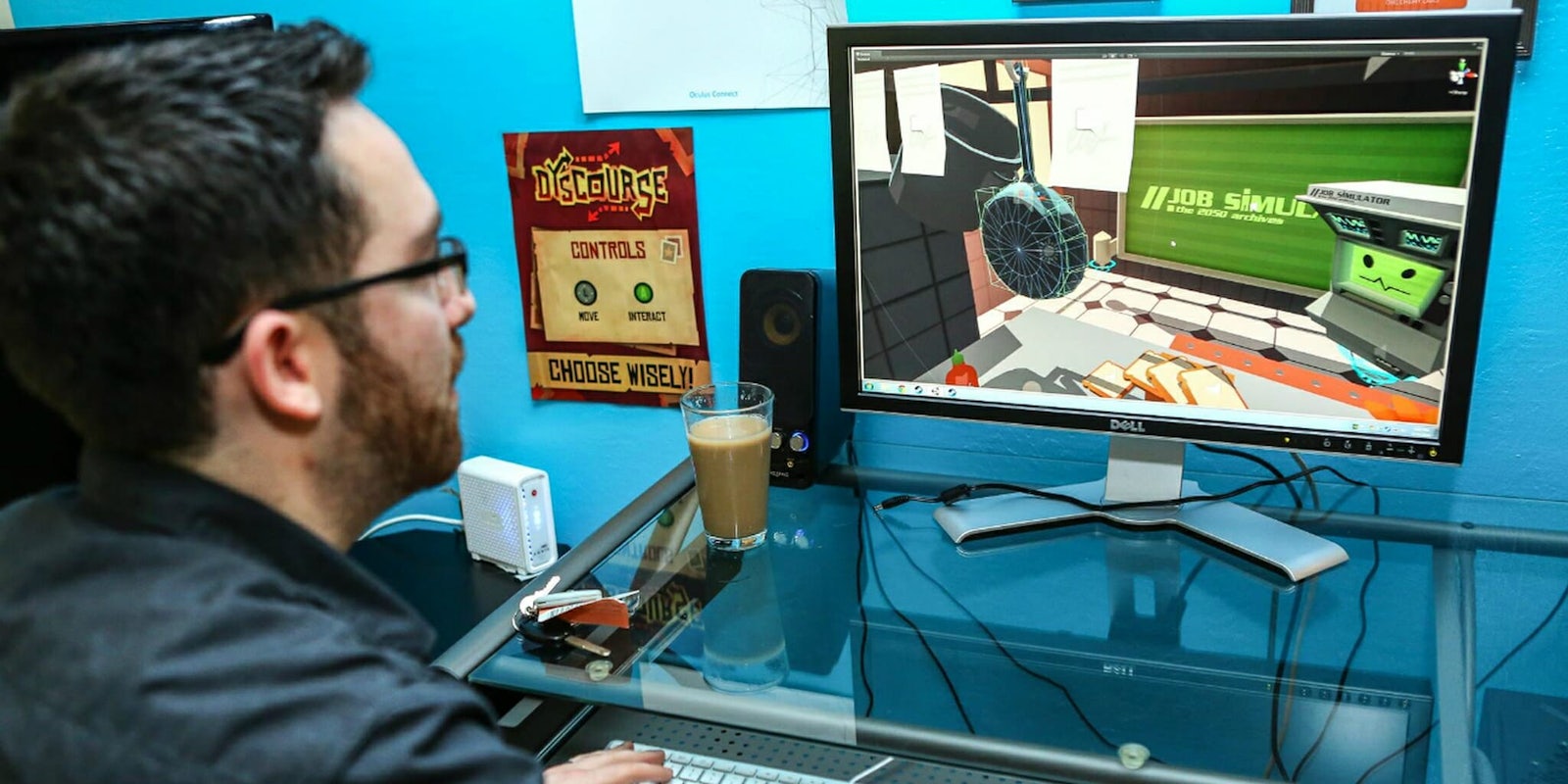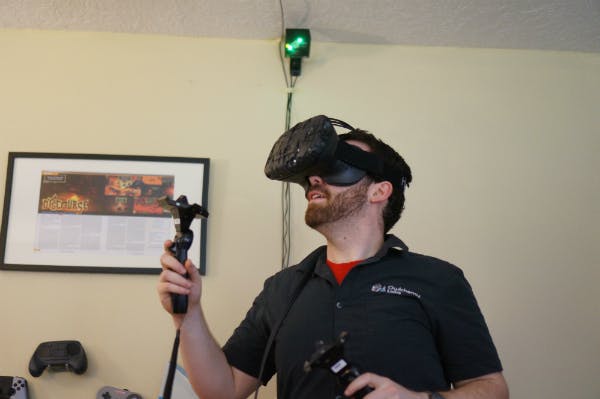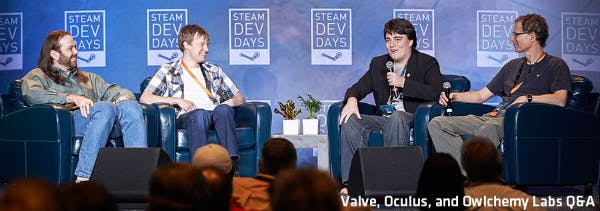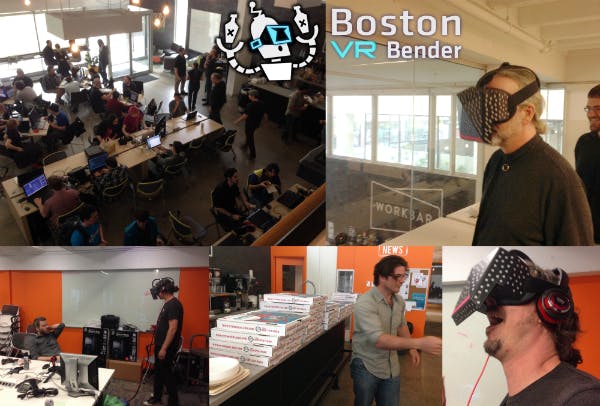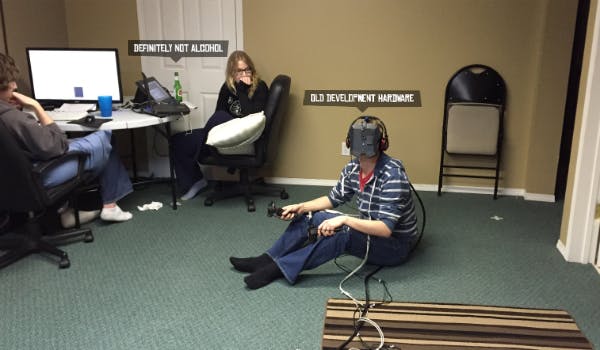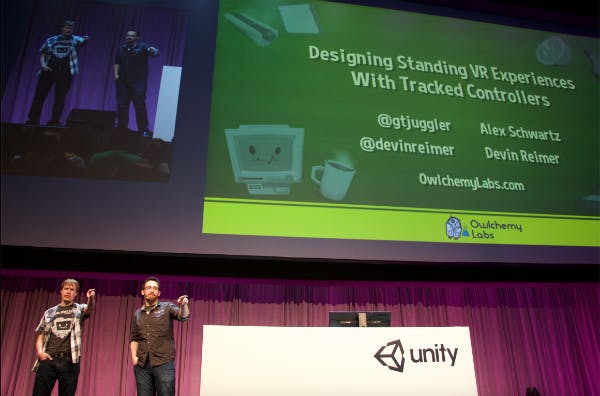It’s the year 2050, and robots have taken over what was once the human labor force. They’ve created a virtual reality simulation to help people remember what it was like “to job.”
That’s the premise of Job Simulator: The 2050 Archives, presented in the bright, colorful, cartoon-like graphics that define the games developed by Owlchemy Labs. A demo of Job Simulator offered at the Game Developers Conference in 2015 had players stand behind a counter in a restaurant where food was prepared. They could remove ingredients from a refrigerator, turn around to face another counter, and pick up cookbooks that could be thrown around the room—virtual hands projected into the simulation tracking perfectly with player’s actual movements via prototype SteamVR controllers.
Working as a short-order cook isn’t exactly the sort of escapism most would expect out of virtual reality, but Job Simulator became one of the stand-outs of the conference. It realized the kind of immersive experience science-fiction authors and technology visionaries have been dreaming of for decades.
Now one year later at GDC 2016 this week, the small Austin, Texas-based company will be leading the conversation about game development for VR hardware, which will finally ship to consumers in the next few months. The technology has almost universally impressed tech industry insiders, researchers, and early adopters with its ability to transport users into alternate worlds. But it remains to be seen if consumers will spend $600 on the Oculus Rift or $800 on the HTC Vive in large enough numbers to make the platforms viable.
Alex Schwartz, the 29-year-old founder and CEO of Owlchemy Labs, is confident that, with untold billions already spent on the development of VR hardware and software, it’s too big to fail. In fact, he’s betting everything—his professional reputation, his company, and the livelihoods of his 14 employees—on it.
Born under fire
When you talk to Schwartz, you can see an amused glint in his eyes behind his corrective lenses. He looks like he’s always on the verge of laughing and breaks frequently into a smile—and he loves a bad pun.
He’s been working with computers for most of his life, getting his start at his father’s licensed Apple retail and repair store, installing clients’ new computer systems at age 12. In high school, he recreated levels of Halo: Combat Evolved in his spare time, and later studied at Worcester Polytechnic Institute, eventually running its Game Development Club.
If you observe Schwartz closely, you might notice a nervousness under his good-natured demeanor, as if he is occasionally unsure of his footing.
Schwartz founded Owlchemy Labs in October 2010, and found himself marred by controversy shortly thereafter. Owlchemy’s first title was an irreverent and politically incendiary game where players had to keep a group of undocumented immigrants from bouncing out the back of a pick-up truck as it headed for the finish line, i.e. the U.S. border. Comedian George Lopez found the game amusing. Groups like the New York Immigration Coalition did not. Apple rejected Smuggle Truck when it was submitted to the App Store that March.
“To our discredit, we hadn’t quite put enough of the satirical elements into the game at that point,” Schwartz reflected. “The obvious thing we were building was a statement about how the American legal system was so fucked, the immigration process in America was so terrible that it’s easier to get yourself over the border in a truck than it is to get a real visa.”
Owlchemy, which at that point consisted of Schwartz and some contractors, spent two days swapping out graphics, turning the illegal immigrants into fuzzy bears, and renamed the game Snuggle Truck. Apple accepted the game the following month. Owlchemy ported the game to Android devices and also sold a version of the game for PC on Steam. Between the three platforms, Schwartz’s company made enough money on Snuggle Truck to fund the development of its next game, Jack Lumber, which for small indie developers is sometimes the best they can hope for.
“He made a prediction at the moment that this Kickstarter was happening—and very few people could see the writing on the wall at that point—that this was a major paradigm shift.”
The blockbuster success of Oculus Rift’s Kickstarter campaign in August 2012, however, dramatically changed the company’s direction. Owlchemy’s chief technology officer, Devin Reimer, for years had been passionate about virtual reality technology. “He made a prediction at the moment that this Kickstarter was happening—and very few people could see the writing on the wall at that point—that this was a major paradigm shift in the future,” Schwartz said. “The creation of a new medium: VR.”
Schwartz and Reimer pledged to the Kickstarter and thought about which of their games could be most readily ported over to VR when they received their Oculus development kit. They discovered that fans of Aaaaa! for the Awesome—a collaboration with Boston-based indie studio Dejobaan Games in which players base-jumped and performed mid-air stunts for points—had been begging to see the game ported to the Oculus Rift.
“It took one day to integrate the Oculus software development kit,” Schwartz said, “and then 29 days to remove things that made us sick and redesign the user interface and the interactions to be more VR-focused.” Aaaaaculus!—a pun name for which Schwartz claims credit—was released in August 2013 and was the first game on Steam, the digital distribution PC game service owned by Valve Software, that had VR support and was not made by Valve.
That nimble dash to the front of the pack put the tiny studio in position to capitalize. Aaaaaculus! garnered Schwartz and Reimer an invitation to Steam Dev Days, a two-day game developer conference in February 2014 held at Valve Software’s headquarters in Seattle. They were received as authorities on VR, sharing stage space with Oculus wunderkind Palmer Luckey and other legendary developers. Owlchemy was one of the first indie studios that had moved past the theoretical stage with VR and actually built a game people could play.
Schwartz and Reimer were also among the developers at Steam Dev Days who tried new virtual reality hardware in development at Valve. The new tech prioritized the user’s ability to stand up and walk around a small room while wearing the headset, using new position-tracking technology.
“I walked out of that room having had a religious moment, and thought, ‘I wish we could just not ship Dyscourse”—a story-driven game about a group of people who survived an airplane crash—“and drop everything we’re doing and make VR games starting today,’” Schwartz said. “And I just knew that’s what we wanted to do, but we had these obligations and we had all the sunk cost, and had a game that was almost done. And so we needed to finish up the game, but it was painful because we were so sold on where we needed and wanted to go, right then.”
Dyscourse was in mid-development when Schwartz and Reimer heard the siren call of VR—and it was the most expensive game Owlchemy had ever developed, to the point where the studio had turned to Kickstarter to raise the funds. Whether Dyscourse would become a success was almost irrelevant when it was shipped in March 2015. Owlchemy was already moving in a new direction.
Turning enthusiasm into authority
The next turning point for Owlchemy came when Valve tapped Schwartz and Reimer to organize the Boston VR Bender game jam from May 31 to June 2, 2014. Developers use game jams to develop a prototype of a new game, often over a single weekend, while working off a given theme. Valve wanted to know what game developers could make for their hardware—and it trusted Owlchemy to help them find out while keeping under wraps that the jam was actually Valve’s idea.
“They were taking their hardware that they were working on internally and bringing it outside their walls for the first time ever at that jam,” Schwartz said. Valve revealed the Vive room-scale virtual reality system, created with hardware manufacturer HTC, to developers a few months later and announced it to the public at the 2015 Game Developers Conference. It was for Valve’s showcase at the conference that Owlchemy developed its breakout hit, Job Simulator, but the game almost didn’t happen.
This is high stakes. This box has to be on our doorstep by this day, or we’re fucked.
The success of the game jam helped Owlchemy convince Valve to give the little studio a shot at developing a game demo for GDC 2015—even though Valve was taking a huge gamble sending the company one of its precious few hardware prototypes. But Reimer’s wife was expecting twins at the time, preventing him from leaving his home outside Winnipeg, Canada. Like only a small studio could, Owlchemy decided to bring its prototype development session to him, accepting the significant risk of shipping the hardware.
“I remember talking about Canadian customs, and shipping weird hardware with lasers in it,” Schwartz said. “Valve was like, ‘Yeah, we shipped something to the U.K. a few days ago and it got stuck in customs.’ We’re buying flights to go to fucking Canada for a week so that we can [develop a prototype]. If it’s off by three days, four days, no game will get made. This is high stakes. This box has to be on our doorstep by this day, or we’re fucked.
“We were so close to this not working,” Schwartz continued. “By the time we started, there were teams who were already showing their work to Valve.”
The Vive development kit did arrive in time for Owlchemy to work up a demo, and Valve’s faith in the studio paid off. Word about Job Simulator spread at the conference when the game was shown as part of a collection of demos for the debut of the HTC Vive hardware.
Owlchemy’s shock-value put it on the map with Smuggle Truck. Five years later, it was leaving industry insiders slack-jawed in a completely different way.
The future of VR
Owlchemy’s early adoption of VR continues to make Reimer and Schwartz leading voices in the space. They were the only developers discussing the rules of room-scale VR in September at the Oculus Connect 2 developers conference in Los Angeles, and Schwartz is an advisor for the Virtual Reality Developers Conference at GDC 2016, which starts today in San Francisco.
What put Owlchemy ahead of the curve in the VR development space can’t just be chalked up to lucky breaks and its agility as a small operation. It’s been propelled by an unrelenting faith in the success of VR, and a keen sense of where the company fits into the broader industry.
“We realized that without us, without great content, these companies were building pieces of plastic that did nothing, right?” Schwartz said. “When we rode that wave with Valve on that first, initial GDC announce of Job Simulator, and the world went insane and the press reviews were ‘My life was changed, I threw a tomato and I saw Jesus,’ whatever the fuck… That led to phone call from Sony, a phone call from Oculus, ‘OK, we need to get your game on our platform, how does this work?’”
Owlchemy has to be diplomatic about how it deals with all three companies, as there are notable distinctions between them. Schwartz has gone on record that he thinks room-scale VR, which only HTC and Valve are currently pursuing, is where developers want to be. Their approaches are all still evolving, though, and Owlchemy has a front row seat to the process.
“All three of these companies understand and know that they have to be in it for the long game, and that making a VR hardware play is a long-term strategy, and you don’t make money in the early days selling super high-end hardware to a small group of people,” Schwartz said. “You can easily miss the boat if you don’t make a play like this.”
Of course plenty of companies have no desire to be on the first boat traveling into virtual reality’s uncharted waters. Major publishers like Blizzard and Electronic Arts have declared that they’re sitting VR out until the market proves itself. The problems facing VR are so terrifying because they are so fundamental. If you haven’t tried VR, you can’t possibly understand it. If you don’t attend events like technology conferences, or have friends in the software development business, you probably won’t get a chance to try VR for yourself for years. And why would you spend $600 or $800 on a VR rig if you don’t understand it or have never tried the product?
The challenge is multiplied by the fact that gaming is the gateway industry for VR. Hardcore gamers have notoriously short attention spans. The cycle of new, hyped technology that’s supposed to revolutionize gaming comes and goes quickly, as seen by 3D gaming monitors and motion-control systems like PlayStation Move and Microsoft’s Kinect. Hardcore gamers could relegate VR to the same fate if the technology doesn’t prove itself quickly enough. Some industry experts like John Riccitello believe VR won’t be raking in huge profits until 2020.
“I can see a version [of the future] where gaming and entertainment don’t become as big a part of VR as we thought it would be,” Schwartz said, “and our talents in designing virtual reality experiences get applied to other areas. Either way, I think there’s going to be a big future in the kinds of things we’re doing, and I don’t see that ending in a direction where this doesn’t support us or make us money.”
That’s a backup plan that still revolves around the assumption that VR goes somewhere. Schwartz doesn’t see the point of worrying to the contrary. “It doesn’t matter. I don’t have to think about that side of things because it’s not going to happen, and if it somehow does we go out of business, and that’s the end.”
The end of working in VR, in any case. Even then, Schwartz believes that Owlchemy’s time spent pioneering in the VR industry will prove valuable.
“VR is the confluence of optics, rendering, hardware and input, extremely fast graphics technology, all of this comes together, and all of these are very fast paced industries that have other applications. VR is the medium that brings together all these other industries,” Schwartz said. “Our work in the entertainment/gaming space could be applied to the medical field, the simulation field, military, training, travel, architecture, various visualization fields… The list goes on.
“The lessons learned there extend far beyond a silly game about work.”
Photo via Owlchemy Labs
